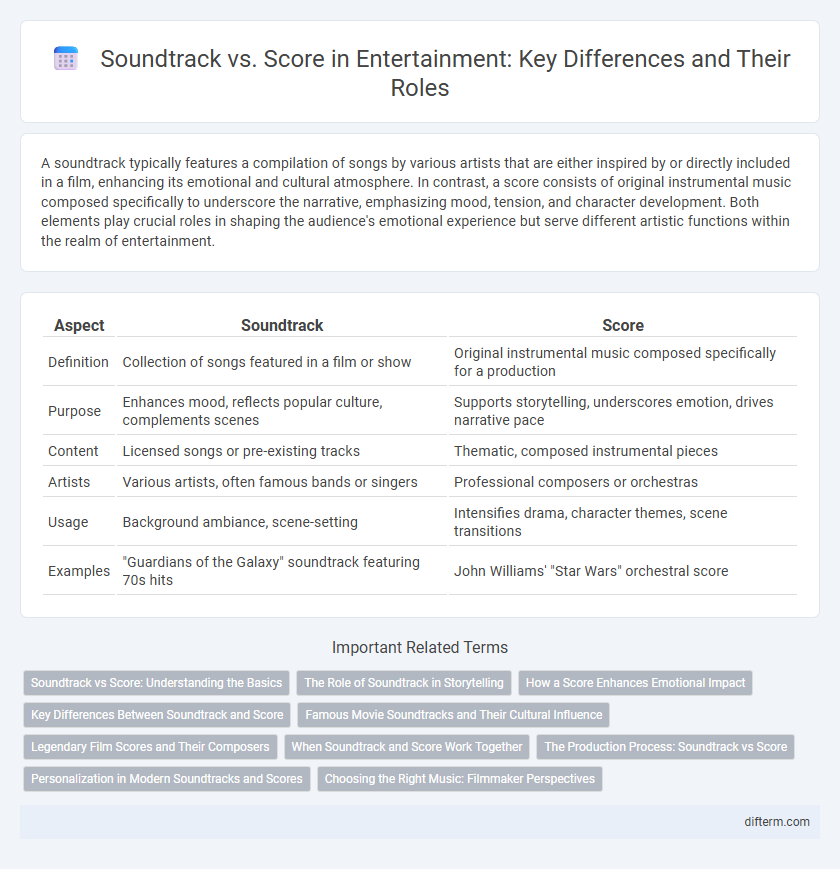A soundtrack typically features a compilation of songs by various artists that are either inspired by or directly included in a film, enhancing its emotional and cultural atmosphere. In contrast, a score consists of original instrumental music composed specifically to underscore the narrative, emphasizing mood, tension, and character development. Both elements play crucial roles in shaping the audience's emotional experience but serve different artistic functions within the realm of entertainment.
Table of Comparison
| Aspect | Soundtrack | Score |
|---|---|---|
| Definition | Collection of songs featured in a film or show | Original instrumental music composed specifically for a production |
| Purpose | Enhances mood, reflects popular culture, complements scenes | Supports storytelling, underscores emotion, drives narrative pace |
| Content | Licensed songs or pre-existing tracks | Thematic, composed instrumental pieces |
| Artists | Various artists, often famous bands or singers | Professional composers or orchestras |
| Usage | Background ambiance, scene-setting | Intensifies drama, character themes, scene transitions |
| Examples | "Guardians of the Galaxy" soundtrack featuring 70s hits | John Williams' "Star Wars" orchestral score |
Soundtrack vs Score: Understanding the Basics
The soundtrack of a film typically refers to a collection of songs used throughout the movie, often featuring popular or licensed music that enhances the mood and connects with the audience emotionally. In contrast, the score is an original instrumental composition created specifically for the film, designed to underscore the narrative, heighten tension, and support character development. Understanding the distinction between soundtrack and score is essential for appreciating how music shapes the cinematic experience.
The Role of Soundtrack in Storytelling
The soundtrack plays a crucial role in storytelling by enhancing the emotional landscape through carefully selected songs and lyrical content that reflect character development and plot themes. Unlike the score, which primarily consists of instrumental music designed to support mood and pacing, the soundtrack often includes popular music that connects audiences to specific cultural moments and deepens narrative immersion. By integrating diverse musical genres and iconic tracks, the soundtrack amplifies the story's emotional resonance and provides a memorable auditory backdrop that complements visual storytelling.
How a Score Enhances Emotional Impact
A film score intensifies emotional impact by using orchestral arrangements and motifs that align with characters' inner feelings and narrative arcs. Scores manipulate tempo, dynamics, and harmony to subtly influence audience reactions during crucial scenes. Unlike soundtracks that feature pre-existing songs, scores are composed specifically to deepen viewers' emotional connection with the story.
Key Differences Between Soundtrack and Score
A soundtrack encompasses all the music featured in a film or show, including songs by various artists that may be licensed or original, while a score refers specifically to the instrumental background music composed to enhance the narrative and emotional tone. Soundtracks often include popular songs that contribute to the setting or mood, whereas scores are tailored compositions that underscore scenes, character development, and plot progression. Understanding the distinction is crucial for appreciating how both elements collaborate to enrich the entertainment experience.
Famous Movie Soundtracks and Their Cultural Influence
Famous movie soundtracks like "The Bodyguard" and "Guardians of the Galaxy" have shaped popular culture by blending iconic songs that resonate beyond the film, creating lasting emotional connections with audiences. Unlike a traditional score, which underscores a movie's emotional tone through original compositions, soundtracks compile diverse tracks that often ignite trends and revive classic hits. This dynamic interplay between soundtrack and score enhances cinematic storytelling while influencing music charts and fan communities worldwide.
Legendary Film Scores and Their Composers
Legendary film scores such as John Williams' compositions for "Star Wars" and Hans Zimmer's work on "Inception" demonstrate the profound impact a film score has on cinematic storytelling, distinguishing it from the broader soundtrack that includes various songs and artists. Iconic scores create emotional depth and thematic cohesion, with composers like Ennio Morricone for "The Good, the Bad and the Ugly" and Bernard Herrmann for "Psycho" elevating the narrative through carefully crafted orchestral arrangements. These masterful scores continue to influence both filmmakers and audiences, cementing their legacy in entertainment history.
When Soundtrack and Score Work Together
Soundtracks feature curated songs from various artists that enhance a film's emotional landscape, while scores consist of original compositions tailored to support specific scenes. When soundtrack and score work together, they create a layered audio experience that deepens narrative impact and audience engagement. This synergy is evident in films like "Guardians of the Galaxy," where licensed tracks complement the original score to enrich storytelling.
The Production Process: Soundtrack vs Score
The production process for soundtracks primarily involves selecting pre-existing songs or commissioning original tracks that complement the film's mood and enhance emotional impact, often coordinated by music supervisors. In contrast, scoring requires composers to create original instrumental music synchronized precisely with scenes to support narrative pacing, atmosphere, and character development. Both processes demand close collaboration with directors and editors but differ significantly in creative approach and technical execution.
Personalization in Modern Soundtracks and Scores
Modern soundtracks and scores increasingly emphasize personalization, using adaptive music technology that tailors audio cues to individual viewer preferences and emotional states. By integrating AI-driven algorithms, composers create dynamic compositions that respond to narrative changes and audience reactions in real time. This personalized approach enhances emotional engagement and immersion, setting contemporary entertainment apart from traditional static soundtracks and scores.
Choosing the Right Music: Filmmaker Perspectives
Filmmakers emphasize that scores intensify emotional depth by providing original, thematic music tailored to narrative cues, while soundtracks offer curated songs that establish mood and cultural context. Choosing the right music involves balancing a score's cohesive storytelling power with a soundtrack's ability to evoke specific atmospheres or audience connections. Directors often collaborate with composers and music supervisors to integrate both elements strategically, enhancing the film's immersive impact.
soundtrack vs score Infographic

 difterm.com
difterm.com